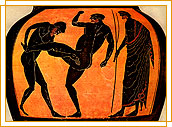The rules of the pankration
All the holds used in wrestling and all the blows used in
boxing were allowed in pankration contests.  Only biting and
punching the opponent's eyes were forbidden everywhere except
Sparta. Therefore, the pankration was the most dangerous and
toughest of all events, since victory was pursued at all costs,
regardless of the dangers for one's life or the opponent's. Only biting and
punching the opponent's eyes were forbidden everywhere except
Sparta. Therefore, the pankration was the most dangerous and
toughest of all events, since victory was pursued at all costs,
regardless of the dangers for one's life or the opponent's.
There were two types of pankration:
- Ground pankration, in which the contest continued after the opponents had fallen to the ground. It was the type used in contests.
- Standing pankration, in which the opponents had to remain on their feet. It was used in training or in preliminary contests. This was a much lighter and safer version of the game.
The athletes of pankration did not wear gloves as the boxers did, so the blows were not as painful; however, a pankratiast was allowed to hold his opponent with one hand and hit him with the other, something forbidden in boxing.
The fighter who fell to the ground first was in a difficult position, for his opponent was able to fall on top of him and immobilize him with his legs, leaving his hands free to hit him or apply a chokehold. The fighter who fell would try to turn on his back and use his arms and legs to protect himself. Slightly built athletes often fell deliberately on their backs, a device called hyptiasmos (back fall).
Kicking was an important part of the pankration. A kick in the stomach was called gastrizein. The hold, in which a fighter held his opponent's foot as tightly as he could to make him lose his balance, was called apopternizein (foothold).
|
